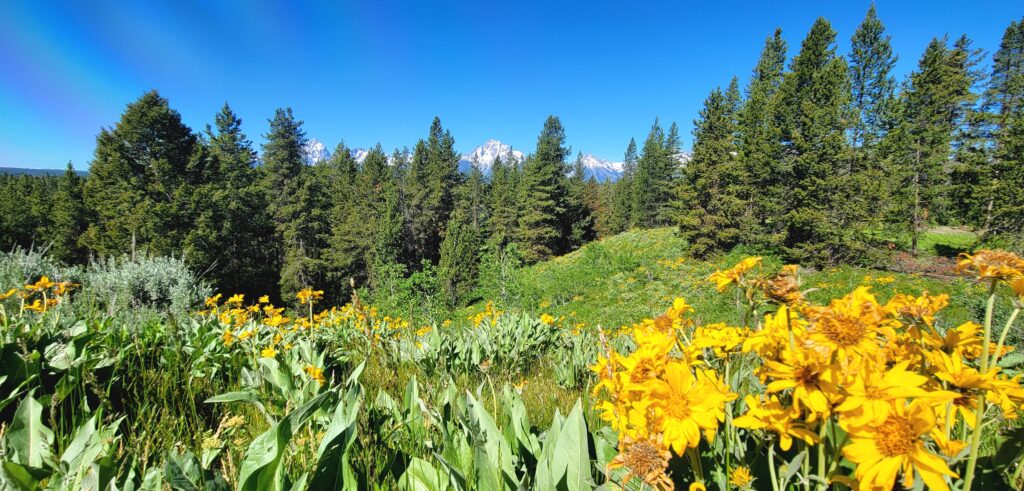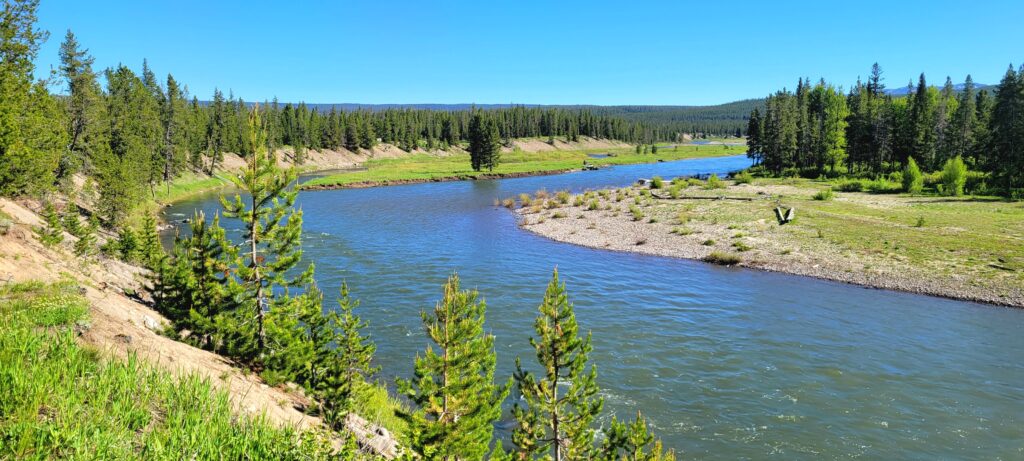
I never considered the difference between a cowgirl, a cowboy, and a wrangler. Terms cowgirl and cowboy distinguish between genders and specify the same profession, but a wrangler as a gender-neutral term is not very descriptive. I always thought that Wranglers is a brand of blue jeans for the blue-collar working people, but a day came when I was enlightened.
It was in Yellowstone National Park where my father and I went RVing, and where for a few days my brother visited us as a fly in – fly out tourist. During that visit we signed up for a two-hour horseback riding excursion through the meadows and forests of Yellowstone. My father was so excited to venture into the wilderness that on the day of the activity he woke me and my brother at 5 AM. Horseback riding was scheduled to begin at 8:45 AM and the location was about one hour driving distance – really, we could sleep a little longer but my men did not want to be late and insisted on leaving at 6:30 AM, sharp. Politely procrastinating, I was able to delay them to 6:45 at which time their anxiety boiled-over and they couldn’t wait any longer. We were the first people to arrive at the closed activity center. Luckily every place in Yellowstone is beautiful and I could enjoy the awe-inspiring vistas and smell the fragrance of wild sage.
An hour after our arrival workers strolled into the facility and we started to check-in. The process consisted of the usual waiver signatures and an unexpected weight check. Like a bunch of overgrown jockeys at the Kentucky Derby, we formed a line in front of a scale — one by one we stepped on hoping that the digits stay below the 240-pound weight limit. Finally, when the bureaucracy was over, we stepped outside where six young women dressed from head to toe in western attire met us. They wore cowgirl hats, plaid shirts with snaps, dark blue jeans (could be Wranglers) with wide leather belts featuring large shiny buckles, and of course boots capable of walking through or kicking horse manure. These young women were our wranglers. How did I know that they were wranglers as opposed to cowgirls? Simple – because they told us so.
We lined up and the wranglers proceeded with their selection. Strolling slowly amongst the participants, they looked us up and down — I felt objectified as a young wrangler stopped in front of me and her eyes proceeded from the tip of my head to the souls of my brown leather riding boots.
“Nice boots,” she said with a warm smile.
It was a pleasant comment that broke the ice and put me at ease as the wrangler-girl asked me to follow her towards a carefully selected horse. She handed me the reins and said, “This is Chuckseye, she will be your horse for today.”
Chuckseye was a loud snorter. Being a horse novice, I could not tell if her snorting was associated with a horse-allergy or if in horse language Chuckeye was saying, “I do not want to be here, and I do not want to carry your heavy butt on my back today.”
I looked around and noticed that both my brother and dad were already holding reins to their horses. My brother was paired with Gillette and my dad was rubbing the nose of Poker-Joe.
The wrangler chose correctly when she paired my brother with Gillette – one of them the world’s biggest farter and the other a potential winner of a farting Olympics. I certainly wasn’t about to follow this pair.
Poker-Joe was a kicker who had to be the last horse in line otherwise when the mood struck him, he could deliver a solid kick with his hind legs — I certainly was not about to get behind my dad and Poker-Joe. The last piece of business before we took off on our six-mile journey was to leave our cell phones behind.
Around us was a vast green meadow sprinkled with oversized daisy-like flowers pointing their sturdy faces towards the sun. One of the wranglers told us that these white flowers are called Mule Ears Daisies. In my opinion they did not resemble mule’s ears but rather small sun flowers. We saw similar flowers in the piedmont of the Grand Teton where they were yellow but here in Yellowstone they were white with yellow centers.
“You are lucky to see such display of wonderful flowers,” said one of the wranglers, “soon they all will be gone. Mule deer love them and within a few days will eat the heads of the flowers leaving only the green stalks.”
As she spoke, I studied the wranglers a little closer — these women looked tough but were as caring as kindergarten teachers. Each one cautiously circling around us, fixing our stirrups, adjusting saddles, instructing us how to handle our horses to assure that we proceed forward in an organized line, and making sure that no one gets behind Poker-Joe – don’t want anyone to get kicked. Curious, I asked about their stories, the three wranglers that attended to our group were students from Arizona, Texas and Philadelphia, respectively studying veterinary medicine, prairie ecology, and agricultural science. One of the girls told us that being a wrangler in Yellowstone was fantastic summer employment, and while the accommodations were rudimentary and food was nothing to write home about — the money, specifically the tips, was excellent and nothing could beat the rewarding wrangler experience.
The wranglers were rather chitty-chatty and displayed high EQ (emotional quotient), being friendly to the tourists makes everyone happy, increases the fun-factor, and therefore the amount of the wrangler’s tip. In addition to sharing titbits of local knowledge we were introduced to amusing stories. A wrangler admitted that these stories are told mostly for entertainment and while loosely based on facts they are not necessarily historically accurate.
There once lived a man named Truman C. Everts, who was a tax collector in Helena, Montana. He was bored with his job, hated to be chained to his office desk and craved a little excitement in life. In 1870, Everts heard that Henry D. Washburn, the surveyor-general of Montana, was organizing an expedition to chart the unknown territory of Yellowstone. Hearing stories of pools of boiling water, prismatic rainbows, and water spewing from inside the earth, Everts wanted to see the wonders with his own eyes and eagerly signed up to participate in the expedition.
Finally, I will experience something spectacular in my life and get away from the dull days at the office, thought Everts. He packed his stuff and joined the group of prominent individuals accompanied by a five-soldier military escort — they became known as the Washburn Expedition.
The group camped in various locations in Yellowstone and rode daily into the wilderness to chart and document the region. They decided that as long as they were within earshot, they could keep the group together. One sunny morning the group mounted their horses and embarked on a scouting mission. Following the agreed protocol every once in a while, a man would yell “ahoy,” and another man would respond with an “ahoy” back. Everts followed the procedure and as he rode into the woods periodically sounded his “ahoy” and reliably heard an “ahoy” coming back — he was confident that his companions were close by. A few hours into the ride he realized that the “ahoy” responses were not coming from his traveling companions but rather he was hearing an echo of his own voice bouncing of the mountains — consequently Everts realized that he was lost and alone.
Full of anxiety and a bit uncomfortable, he got off his horse to assess the situation and tighten the saddle, but something spooked the horse and as soon as Everts’ foot came out of the stirrup, the horse ran off with all the equipment and provisions.
This is not the best of my days, thought Everts, I’ll have to proceed on foot. Dear Lord — I hope that my companions are not too far off. If not the others, our military escort will surely come looking for me — it’s just a matter of hours.
Everts was inspired by the spirit of adventure and was proud of himself when he used his spectacles to start a fire. Warmed by the flames and confident that the soldiers will soon find him, Everts dosed off in a relaxed slumber — unfortunately being a big city accountant and not a frontier man, he neglected to clear pine needles from around the fire — sparks lit the pine needles and spread to the nearby trees which lit-up as fast as gasoline infused torches.
Holy Smoke! Everts managed to start the first man-made forest fire in what was to become the Yellowstone National Park — long before Smokey Bear took up his post as the guardian of the forests warning visitors about the dangers of open fires.
The trees were not enough for the blazing fire — the hungry flames jumped onto Everts himself and burned the clothes off his back — he was now a naked man with burn wounds all over his skin.
At this point an average tax collector might have given up and laid down to die, but Everts was anything but average and continued believing that his party will soon rescue him.
At the time many stories circulated about savage Indian tribes and wild animals thirsty for human blood. Everts decided that by sleeping upright he would be agile and ready to respond quickly to potential threats. Unfortunately, despite this precaution while resting and recuperating, our brave hero was viciously attacked by a mountain lion who chewed and scratched his previously damaged body. But feisty Everts did not capitulate without a fight; using tree branches and rocks, he managed to chase the mountain lion away.
The adventure continued for our tortured explorer — events went from bad to worse when the weather turned and the temperature dropped. It became cold, very cold – the weather turned from cold to freezing as fluffy snow began to fall from the gray clouds above. Everts thought that he was done for and destined to freeze to death. Suddenly like a gift from God, he came upon a hot spring — overjoyed with the positive turn of events Everts jumped into the hot spring like a frog jumps into a shallow puddle. Unfortunately, that was another careless miscalculation by the inexperienced adventurer, the spring was indeed hot steaming at 198 degrees Fahrenheit. How much more abuse can a human body take?
As the hours passed the Washburn expedition realized Everts was lost in the no-man’s-land, and he was not coming back. For a few days, they searched in the vicinity of their camp but no one wanted to venture further into the wilderness. Short on manpower and unable to perform a proper search and rescue, the group packed camp and returned to Bozeman — they reported Truman C. Everts went missing in Yellowstone. It’s been thirty-five days since the man’s disappearance — to encourage a recovery, the local judge offered a six-hundred-dollar reward for the body of Truman C. Everts, the tax collector from Helena, Montana. Yellowstone is a vast area and the probability of finding a body was similar to the proverbial finding a needle in a haystack, therefore while the reward was generous, about $13,500 in today’s dollars, no one wanted to invest time into a wild goose chase. The investment towards the effort and the possibility of finding Everts’ body simply did not calculate.
Two days later, a local bear trapper was prowling through the woods when he came upon a strange naked bear curled up under a sage bush. He thought it peculiar as he never seen a naked bear. In the trapper’s mind a bear is a bear and he was about to shoot it. Before he fired the trapper noticed the bear was acting strange, un-bear-like, no need to waste a bullet on such an out of sorts animal; instead, the trapper decided to walk up to the creature and hit him on the head with the butt of his rifle. As he walked closer, the trapper noticed the naked bear was a terribly disheveled mad-man.
The trapper spoke to the disheveled man not really expecting a coherent reply, “By the stroke of God, are you Mr. Truman C. Everts, the tax collector from Helena, Montana?”
The creature miraculously responded in a human voice, “Yes, I am.”
The trapper carried Everts, who by then weighted less than a hundred pounds, back to the town of Bozeman and asked for the six-hundred-dollar reward – but the judge told him, “The reward is for the remains of Truman C. Everts. While sir, the man in front of me is obviously not dead.”
The trapper turned to Everts and said, “Sir, I think, it is your duty to honor the reward and pay me the six-hundred dollars for saving your live.”
Everts, the tax collector from Helena, Montana responded, “You should have left me for dead, it is not my responsibility to honor the reward,” and did not pay the money.
Concluding the story our wrangler disclosed the tale was based in truth but for the entertainment value she embellished some of the details. Those of us interested in the true story of Truman C. Everts could read his account in a book, Lost in Yellowstone – “Thirty-Seven Days of Peril” and a Handwritten Account of Being Lost.
Our horseback riding experience was sedate and perfectly orchestrated — we were a slow-moving caravan where no one was allowed out of line or move faster than the crawling speed of a funeral procession – I bet Truman Everts would be jealous. His party had a five-soldier military escort that failed to protect him while we had our wranglers who were superior protectors for our group. I finally learned the difference between cowboys, cowgirls and wranglers – a wrangler is a subcategory of cowboys and cowgirls — while the term is not new, it is amazingly modern — specifically its gender neutrality. Cowboys and cowgirls work on a ranch — their job consists of feeding, branding, and caring for the animals (especially cattle) and also taking care of the ranch — including mending fences, taking care of the buildings, and solving any water issues. A wrangler oversees livestock and is responsible for taming, controlling, and handling various animals, especially horses. Our wranglers specialized in horse business and taking care of the tourists and they did not lose a single one of us. Unlike the amazing Everts adventure, ours was limited to observing scenery of Yellowstone with its rolling meadows full of flowers and an occasional mule deer poking their heads at us from a faraway distance. For a college student being a wrangler in Yellowstone must be an amazing summer opportunity full of inspiring sights, comradery, and of course a resume building experience – something cool to talk about at a job interview after college graduation. For me this was an amazing way to spent a day with my men in Yellowstone, an experience worth writing home about.






